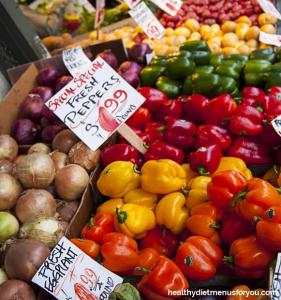 Day three of learning to shop at the farmer’s market. I hope you have found this series valuable, and I want to give you some more valuable farmer’s market tips that will allow you to get the most out of your trip.
Day three of learning to shop at the farmer’s market. I hope you have found this series valuable, and I want to give you some more valuable farmer’s market tips that will allow you to get the most out of your trip.
Before, we have talked about how to get the right information and getting to know your growers. You also know that it’s important to understand what’s in season to get the most bang for your buck at a farmer’s market.
If you want to know what to do with the food you buy at a farmer’s market, you can check out our meal plans and learn more about how they offer meal patterns to help you use the food you bought for your renal, diabetic or cardiac diet.
7. Local food versus Organic Food. To quote from organic.com, “Simply stated, organic produce and other ingredients are grown without the use of pesticides, synthetic fertilizers, sewage sludge, genetically modified organisms, or ionizing radiation. Animals that produce meat, poultry, eggs, and dairy products do not take antibiotics or growth hormones.” Many of the foods you can purchase at a farmer’s market may be organically grown. Some people believe that all your food should be organic. The less use of pesticides and hormones makes for a better environment. But the organic food is also not “pretty” like you are used to in the grocery store. That does not mean it is not good, it just means that we have been conditioned to eat food without blemishes, and you won’t usually find that in organic foods.
Local foods are just that – they are usually grown and transported less than 50 miles to be sold. Grocery stores purchase local foods as well as farmer’s markets. It just means that you are most likely supporting your local community. You can get both organic and local foods at a farmer’s market.
8. Choose some foods but don’t overdo it. You can come back, many farmer’s markets are done two days per week. This allows you to buy what you need then go back again. Because it’s not treated, organic foods tend to “go bad” more quickly. This means you need to only purchase what you are going to use in the next 4-5 days. I would also recommend that you try some foods you don’t normally eat. You may find a new vegetable that you will love.
9. Finally, look up what is in season and then look up some recipes for that week. You should know what is in season and what should be available at the farmer’s market. Then you know how much you are going to purchase based on your recipe, and recipes are the key to using meal plans. So, you know that strawberries and blueberries are in season, find a good recipe that you will love with those two fruits in it and figure out how much you should buy to make that. This keeps you from wasting time at the market, and from wasting your money. Planning your meals is the best way to save time and money.
If you don’t have a plan for your diabetic, cardiac or renal diet, you can start with one of ours –> Click here to go to a page to choose the meal plan you need and learn more.
And tell me about your best find at the local farmer’s market!
Speak Your Mind